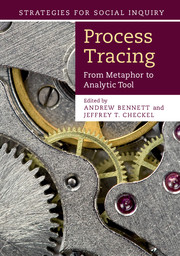1 - Process tracing
From philosophical roots to best practices
Published online by Cambridge University Press: 05 November 2014
Summary
Introduction
Why did the Cold War end peacefully, without a shot being fired? Why did some European democracies survive the interwar period while others were replaced by fascist dictatorships? In the post-Cold War world, civil conflicts have replaced interstate war as the dominant form of organized political violence, with rebel groups – instead of intercontinental ballistic missiles (ICBMs) – as a key focus of both policy and scholarship. Yet what makes such groups tick? Why do some engage in wanton killing and sexual violence while others do not? The European Union is a unique experiment in governance “beyond the nation state,” but how are its supranational governance structures being crafted and with what effect on the ordinary citizens of Europe?
Contemporary political science has converged on the view that these puzzles, and many more on the scholarly and policy agendas, demand answers that combine social and institutional structure and context with individual agency and decision-making. This view, together with recent developments in the philosophy of science, has led to an increasing emphasis on causal explanation via reference to hypothesized causal mechanisms. Yet this development begs the questions of how to define such mechanisms, how to measure them in action, and how to test competing explanations that invoke different mechanisms.
- Type
- Chapter
- Information
- Process TracingFrom Metaphor to Analytic Tool, pp. 3 - 38Publisher: Cambridge University PressPrint publication year: 2014
- 74
- Cited by



